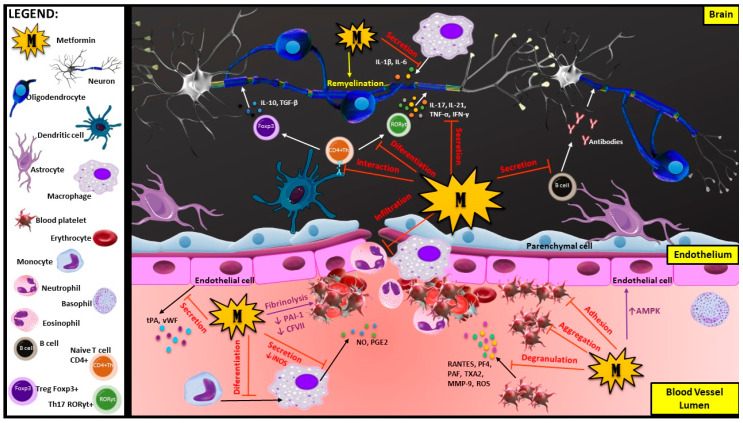Figure 1.
Actions of metformin on immune cells, blood platelets and endothelium during the development of neurodegeneration disease: Metformin has multiple properties such as anti-inflammatory, antioxidant and antithrombotic properties. It may influence different types of cells, including immune cells (oligodendrocytes, macrophages, T cells and B cells), blood platelets and endothelial cells. It may also affect many processes involved in BBB disruption and demyelination during MS development, including pro-inflammatory cell differentiation, degranulation and infiltration of immune cells into the CNS from the blood vessels, as well as myelin repair process (remyelination). As a versatile compound, metformin is responsible for maintaining the Th17/Treg balance by blocking differentiation of CD4+ naive T cell into pro-inflammation RORyt+Th17 cells and stimulation to differentiate into anti-inflammation FoxP3+ Tregs. These actions provide protection against the negative influence of pro-inflammatory cytokines (IL-17, IL-21, TNF-α and IFN-γ) and enhance myelin reconstruction, supporting the remyelination process. Metformin inhibits differentiation of monocytes into macrophages, diminishing the secretion of inflammatory agents (NO, PGE2, IL-1 and IL-6), and inhibits the autoreactive antibodies secretion from B cells. One of the key functions of metformin is blocking the massive infiltration of immune cells (mainly neutrophils and macrophages) into the CNS, which initiates neuroinflammation in MS. This diabetic drug improves the angiogenic functions of endothelial cells by activating the AMPK pathway. Metformin has been shown to stimulate fibrinolysis by decreasing the PAI-1 and CFVII levels in serum as well as has been proven to have an impact on blocking the platelet pro-thrombotic activities by diminishing their adhesion and aggregation. Furthermore, metformin may inhibit the activation of blood platelets, which reduces the secretion of pro-inflammatory cytokines that pull immune cells to the BBB disruption site. Abbreviations: AMPK—adenosine monophosphate kinase; BBB—blood-brain barrier; CFVII—coagulation factor VII; CNS—central nervous system; IFN-γ—interferon γ; IL—interleukin; MMP-9—matrix metalloproteinase 9; MS—multiple sclerosis; NO—nitric oxide; PAF—platelet-activating factor; PAI-1—plasminogen activator inhibitor 1; PF4—platelet factor 4; PGE2—prostaglandin E2; RANTES—regulated upon activation, normal T cell expressed and presumably secreted; ROS—reactive oxygen species; TGF-β—transforming growth factor β; Th17—T helper 17; TNF-α—tumor necrosis factor α; tPA—tissue-type plasminogen activator; TXA2—thromboxane A2; vWF—von Willebrand factor.

